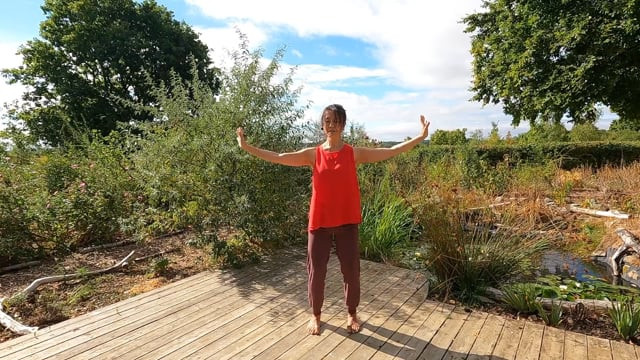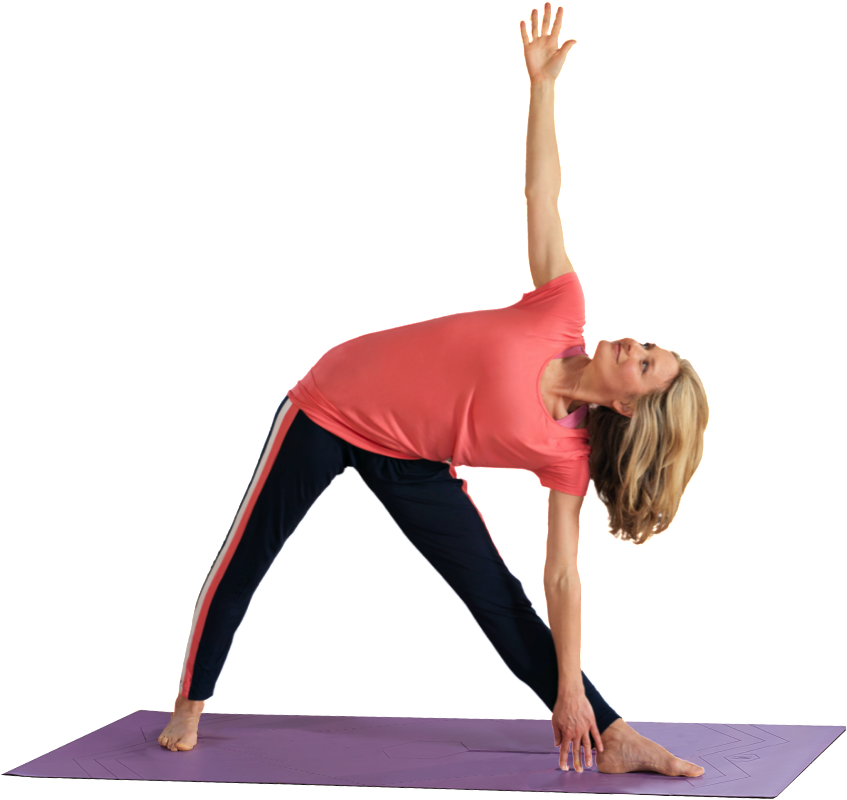All Levels › Mimi Kuo-Deemer
-
 23:29
23:29Qigong for Nourishing the Heart
In addition to pumping and circulating our blood tirelessly all day long, our hearts also work to metabolise all life experience. As such, it deserves to be nurtured and appreciated. This is exactly what we will do in this qigong class! Qigong Fire element meridian forms are followed by practices that cultivate playful intentions and healing energy. All forms will be done standing, but they can also be done seated. No mat necessary! All levels of mobility welcome, these practices are accessible to all bodies.
-
 13:48
13:48Qigong for Healing the Heart
When beset by painful circumstances, the heart can harden and become numb. Nourishment and calm are what slowly begin to heal the heart when it’s been impacted by the difficulties of life, particularly heartache, sadness, and grief. This qigong class includes a short talk, meditation, and gentle movements to help the heart on its journey to healing. This class can be done anywhere - is demonstrated standing, but can be done seated, or is a very beautiful practice when lying down as well.
-
 24:18
24:18Qigong for a Compassionate Heart
Compassion is a natural quality that begins to arise when we begin to free ourselves from the fetters that bind the heart. Qigong forms that help us embody the freedom and spaciousness of the heart will then lead into a practice that awakens our compassion. All forms will be done standing, but they can also be done seated. No mat necessary!
-
 25:37
25:37Qigong for Calming the Heart
In Chinese medicine and Qigong, the heart is seen as the sovereign and ruler of your body. In this gentle qigong class, we explore movements that help calm the heart and help it govern our bodily domain with care, spaciousness and ease. These gentle Qigong forms are accessible to bodies, yet are powerfully calming. This practise can be done standing, but you can also do them all seated in a chair. No mat is required.
-
 29:23
29:23Yoga for Sacroiliac Stability
Sacroiliac (SI) pain can be common in many yoga practitioners. This series of movements, all done on the back when done daily can help address instability and discomfort in the sacroiliac area. It’s also ideal if you’re short on space and time. You’ll need a blanket, block and strap.
-
 24:45
24:45Qigong for Anxiety
A Qigong class with gentle movements to help to calm, ground and ease anxiety. In Qigong and Chinese medicine, anxiety arises when the flow of qi, or life energy, through our organs and meridians becomes stuck, stagnant or caught in chaotic whirlpools. In this class we’ll do practices to support our qi to flow in more natural, balanced ways. When this happens, the tendencies towards restlessness, worry and fear - all things that can trigger anxiety - can gradually start to fall away. All you’ll need is some comfortable clothes and some space to stand.
-
 37:07
37:07Qigong Balance Series 3: Emotional Balance
The third class in the qigong balance series uses movements, mudras and visualisations to guide you through the Chinese organs and meridian systems – each of which has a related emotion. For example, the liver relates to anger, the heart to joy, the spleen to sympathy, the lungs to grief, and the kidneys to fear. When we can help support the optimal function of these organ and meridian systems, our emotions will also naturally find greater natural expression and balance. No props are needed, not even a mat!
-
 36:11
36:11Qigong Balance Series 2: Energetic Balance
This qigong and yoga class is fabulous for balancing our energy levels and is perfect for re-charging fatigue at any time of the day. Tapping into the flow of energy can support greater inner strength and awareness, and help you better self-regulate and maintain your energy levels throughout th day. You’ll need a mat and maybe a bolster for the end in savasana.
-
 23:36
23:36Qigong Balance Series 1: Structural Balance
The first class in this series explores your body’s structural capacity to balance. Movements are gentle, slow and mindful, and this qigong class is an ideal daily practice as we move through the years, to keep our balance and strength. Through yoga and qigong postures that target the feet, legs, and a concept called cross-lateral connectivity, you will discover ways to more easily and gracefully stand on one leg! This is a good series for those who don’t wish to weight bear on their arms, hands and wrists. No props are needed, not even a mat!
-
 55:35
55:35Buddha's Teachings: Yoga for Equanimity
This gently flowing yoga and Qi Gong class explores the fourth of the brahmavihārās, or boundless states, known as upekkha, or equanimity. This fourth abode is often the most misunderstood, as equanimity can easily be written off as indifference and not caring. The Buddha’s teachings suggest this is far from the truth. His description of upekkha is that it is a perfect, unshakable balance of heart and mind, rooted in insight. When we cultivate equanimity, we cultivate a state of being even minded and calm. In this state, we learn to trust, meet and respond to life in ways that let us care deeply and fully about what truly matters. We make room for joy, pain, sorrow and challenges. We learn to meet life in ways that neither opposes nor demands more from it, and can remain steady, trusting and open to whatever grim corners we may turn in life.
-
 55:05
55:05Buddha's Teachings: Yoga for Sympathetic Joy
This yoga class focuses on the third aspect of the Buddha's teachings to awaken the heart, Mudita. Mudita means finding joy in the happiness and success of others. It is the third of four boundless states, or brahmavihārās. This well-rounded class has a particular focus on the hips and the hamstrings, two areas where many of us are tight due to either a sedantary lifestyle, or strengthening workouts. Being happy for others when they are happy are we are not, or they achieve things that we haven’t not the easiest practice. Indeed, ours is a world where comparison, judgement, envy and aggression are rife. Learning to be happy for someone when they are truly happy and shining usually requires a deliberate effort. When we can summon sympathetic joy, the rewards are magnificent and freeing. Through a cultivation of mudita, we can pull out the weeds of pettiness, envy and comparison. We become less selfish and self-centred, and grow into more tolerant, generous and compassionate individuals. Our actions can then create a chain-reaction, where a joyful and charitable heart ripples out into the world. You will just need a mat.
-
 01:02:04
01:02:04Buddha's Teachings: Yoga for Compassion
This yoga class focuses on cultivating a strong and resilient heart that awakens karuna, or compassion. It is the second of four boundless states, or brahmavihārās. Compassion means to be with another’s suffering. It is the opposite of cruelty. It can be conflated with pity, which it is not. Compassion is born out of a selfless desire to stand in solidarity with those who experience misfortune. Misfortune does not have to be starvation, physical pain and loss; it can be as simple as wanting something to be other than it is, which the Buddha described as creating clinging as well as a pushing away of experience. When we begin to cultivate compassion, we start with extending compassion towards ourselves. By forging self-compassion, we create a springboard for extending compassion towards others and all beings in the world. This well-rounded yoga class focuses on heart opening and brings in qigong movements.
Join the Wellbeing Revolution
This is your yoga, your way.
Build a happier, healthier, more sustainable life.
